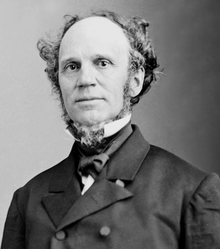Horatio Seymour
| Horatio Seymour | |
|---|---|
 |
|
| 18th Governor of New York | |
|
In office January 1, 1853 – December 31, 1854 |
|
| Lieutenant | Sanford E. Church |
| Preceded by | Washington Hunt |
| Succeeded by | Myron H. Clark |
|
In office January 1, 1863 – December 31, 1864 |
|
| Lieutenant | David R. Floyd-Jones |
| Preceded by | Edwin D. Morgan |
| Succeeded by | Reuben Fenton |
| Personal details | |
| Born |
May 31, 1810 Pompey Hill, New York, U.S. |
| Died | February 12, 1886 (aged 75) New York City, New York, U.S. |
| Political party | Democratic |
| Spouse(s) | Mary Bleecker Seymour |
| Profession | Politician, Lawyer |
| Religion | Protestant |
| Signature | |
Horatio Seymour (May 31, 1810 – February 12, 1886) was an American politician. He was the 18th Governor of New York from 1853 to 1854 and from 1863 to 1864. A leading Democrat, in the 1850s he supported the popular sovereignty ideas of Senator Stephen Douglas. During the war he opposed any union efforts to abolish slavery..
He was the Democratic Party nominee for president of the United States in the presidential election of 1868, but lost the election to Republican Ulysses S. Grant.
Horatio Seymour was born in Pompey Hill, Onondaga County, New York. His father was Henry Seymour, a merchant and politician; his mother, Mary Ledyard Forman (1785–1859), of Matawan, New Jersey, was the daughter of General Benjamin Forman and Mary Ledyard. At the age of 10 he moved with the rest of his family to Utica, where he attended a number of local schools, including Geneva College (later Hobart College). In the autumn of 1824 he was sent to the American Literary, Scientific & Military Academy (Norwich University). Upon his return to Utica after graduating in 1828, Seymour read for the law in the offices of Greene Bronson and Samuel Beardsley. Though admitted to the bar in 1832, he did not enjoy work as an attorney and was primarily preoccupied with politics and managing his family's business interests. He married Mary Bleecker in 1835.
Seymour's first role in politics came in 1833, when he was named military secretary to the state's newly elected Democratic governor, William L. Marcy with the rank of colonel. The six years in that position gave Seymour an invaluable education in the politics of the state, and established a firm friendship between the two men. In 1839 he returned to Utica to take over the management of his family's estate in the aftermath of his father's suicide two years earlier, investing in both real estate and in financial stocks. In 1841 he won election to the New York State Assembly, and he served simultaneously as mayor of Utica from 1842 to 1843. He won reelection in 1842, and again from 1844 to 1846, and thanks in part to massive turnover in the ranks of the Democratic caucus was elected speaker in 1845.
...
Wikipedia
